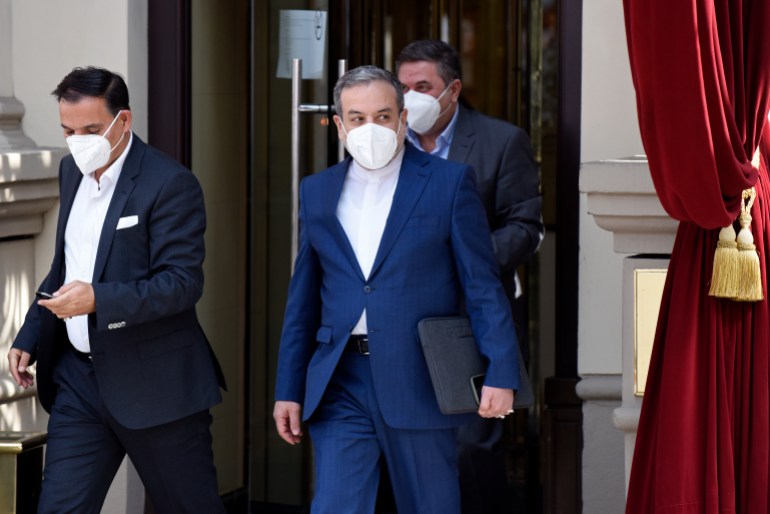American and European calls for Iran to return to nuclear negotiations without delay and to refrain from further escalation over its nuclear program were renewed, while Tehran continued to adhere to the condition of lifting sanctions first, and announced the exemption of its chief negotiator from his duties.
In a speech before the meeting of the Board of Governors of the International Atomic Energy Agency in Vienna, the acting US representative, Louis Bono, considered that Washington is ready to lift all sanctions that are incompatible with the nuclear agreement.
Bono added that this is related to Iran's resumption of compliance with all of its obligations under the agreement, but added that the opportunity for full, mutual compliance with the agreement will not last forever.
In this context, he called on Tehran to abide by what it agreed with the agency's director, Rafael Grossi, last Sunday regarding monitoring procedures.
Immediate stop
In the same context, the European Union called on Iran to immediately stop its activities in violation of the nuclear agreement, and to fully fulfill its obligations.
At the meeting of the IAEA's governors in Vienna, the EU expressed its concern over Iran's continuing activities that are inconsistent with its commitments in the nuclear agreement, such as enriching uranium to a purity of up to 60%.
The Union considered that the high stockpile of uranium enriched with this percentage raises concern, and called on Iran to cooperate with the IAEA in full transparency.
For his part, the Russian delegate to international organizations in Vienna, Mikhail Ulyanov, called on the IAEA to continue dialogue with the new Iranian government, reiterating Russia's call on all parties to quickly return to the nuclear agreement.
A side of Iran's Arak nuclear reactor (Reuters)
Lift the sanctions first
On the other hand, Iran's representative to the IAEA, Kazem Gharibabadi, said that the United States should first lift sanctions before demanding Tehran to abide by the nuclear agreement.
Gharibabadi added - in exclusive statements to Al Jazeera on the sidelines of the IAEA Board of Governors meeting in Vienna - that Iran is ready to return to its commitments if the United States actually lifts sanctions and not on paper.
Abadi stressed that Iran does not mind returning to negotiations, but it does not want to negotiate for the sake of negotiation, describing the atmosphere of the IAEA Board of Governors meeting as positive.
Continue with transparency
For his part, the head of the Iranian Atomic Energy Organization, Mohammad Eslami, said that his country is keen to continue its peaceful nuclear program with transparency and within the legal framework.
During his participation in a meeting in the Iranian parliament, Eslami added that what was achieved in the nuclear program was the result of internal efforts, and no party would be allowed to stop its progress.
Eslami announced that, during his visit to Tehran, the Director of the IAEA discussed issues related to surveillance cameras in Iran's nuclear facilities that were damaged during terrorist attacks.
Abbas Araqchi during an earlier round of talks in Vienna (Getty)
Exemption of chief negotiator
In a remarkable development, Iran relieved Deputy Foreign Minister Abbas Araqchi, who is also the chief nuclear negotiator, from his ministerial duties.
And the Iranian Foreign Ministry indicated yesterday evening that Ali Bagheri - who is close to the new conservative president, Ibrahim Raisi - was appointed as assistant minister, instead of Araqchi.
The ministry did not clarify whether Bagheri - a former member of the negotiating team known for his rejection of any concession to the West - also became the chief negotiator in the nuclear file talks.
It is noteworthy that talks began in April in Vienna, but are suspended today between Iran and the five major powers that are still signatories to the international agreement on the Iranian nuclear file, in an attempt to make way for the United States to return to it.
This agreement - concluded in 2015 - provides for the easing of sanctions on Tehran in return for its pledge not to possess an atomic weapon and to significantly reduce its nuclear program, which was placed under United Nations supervision, but the West accuses Tehran of gradually abandoning most of its commitments after the withdrawal of the United States from the United States. unilateral agreement in 2018.
The ministerial reshuffle comes days after an agreement negotiated between Iran and the IAEA on monitoring Iranian facilities, which raised hopes for an imminent resumption of talks in the Austrian capital.

